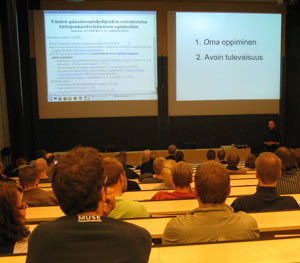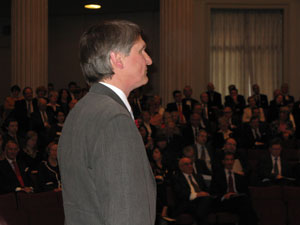Innovative teaching
The Finnish Higher Education Council re-elected the department as a national centre of excellence in higher education, this time for the years 2010-2012. The status of centre of excellence is a significant achievement. It was only conferred on 10 units in Finland this time, and the department was one of two units that were selected for their second period.
The centre of excellence status is the result of long-term, consistent development of teaching and learning, such measures as creating learning-goal matrices for courses in connection with the new syllabus, removing some bottlenecks in degree progress, and supporting student-centred activities - both the multifaceted activities of the student union TKO-äly to support learning and the course organised by the new Lambda society - were taken during the past year.
The new sub-programme structure and degree requirements of the department were designed during the winter and spring, and came into force from the beginning of autumn 2008. There are now three sub-programmes at the department: algorithms and machine learning, distributed systems and data communications, and software systems. Now the teaching at the department is grouped more logically than before, and the new sub-programmes correlate more clearly with the focuses of research at the department. One of the principles while renewing the degree was, indeed, to further base the MSc-level teaching on the strengths in research at the department. The Department of Computer Science also has two international Master's programmes, in bioinformatics (MBI) and information and communications technology (CBU-ICT).
Here are some good details from the report(whole report can be downloaded from the link at the bottom of the page):
Teaching
Curriculum and course design
Development of teaching
Studing and students
|
|
Year 2007 a large survey of computer science research was made. This survey also noted our department high quality students:
The Department attracts outstanding students and has excellent international network of collaborations and exchange visits.2
[1] The Finnish Higher Education Council: Centres of Excellence in Finnish University Education 2010–2012 (report 03:2009), p. 68-69.
[2] Academy of Finland: Computer Science Research in Finland 2000–2006: International Evaluation (Publication of the Academy of Finland 8/07), s. 43-44.

 Orientoivissa opinnoissa tehdään pelin henki selväksi
Orientoivissa opinnoissa tehdään pelin henki selväksi
 The first Europe-China workshop on big data management was successfully held on the 16th of May, 2016 at the Department of Computer Science, University of Helsinki.
The first Europe-China workshop on big data management was successfully held on the 16th of May, 2016 at the Department of Computer Science, University of Helsinki.